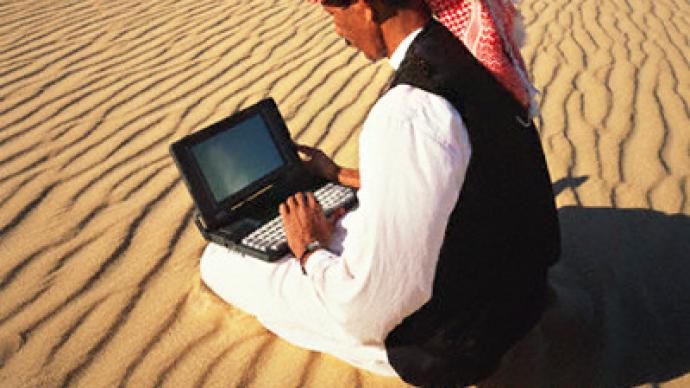Egypt’s web of protesters

The unrest that has been sweeping North Africa over the past month is now raging in Egypt. Protesters use Facebook and Twitter to organize and coordinate rallies, and calls for new protests gather several thousand supporters within hours of posting.
Hacktivists trying to oust Egyptian president Hosni Mubarak have gathered in the streets of the country’s resort cities and Cairo. Seven years ago, when Facebook made its appearance on the internet, it was regarded solely as a place where users could rate photos and track each other’s private life. Today, 65 million Egyptians have mobiles, and more than half of them have access to the internet and are registered on Facebook which makes social networks an extremely influential resource. The messaging system and private online groups allow users to plan the time and venue of the next protest without the authorities controlling them.Facebook is one the most robust networks and is practically impossible to break into. “The Egyptian authorities that were for obvious reasons interested in the time and venues of the protests, might have asked the law enforcement agencies permission to access private messages in the read-only mode. The permission could not be granted thus Egyptian authorities had to resort to the shut-down of internet in the country which the whole world witnessed in the past few days”, Oleg Yashin, head of the intellectual property protection department the “Russian Shield” association told RT.Egypt's government suddenly ordered all of the country's ISPs to shut down their services on January 17 late at night. Mobile networks have also been turned off in some areas for the same reason. Still, Egyptians struggle to keep online using landline telephones, radio and sometimes even fax machines for the sake of maintaining contact with the outside world. To avoid the unnecessary questions and fines the few Egyptians who find a way to access the internet are taking all precautions to make sure their online activities are not being watched.Google is not willing to stay indifferent for its part. It has generated a new service for Egyptians – voicemail left by the country’s citizens will appear on a web page that will link to Twitter messages posted by Google. "Anyone can tweet by simply leaving a voicemail on one of these international phone numbers … and the service will instantly tweet the message using the hash tag ‘egypt’," Google said in a blog posting. "No internet connection is required."
Organize online, protest in person
In the last month a dozen groups dedicated to organizing political protests have appeared on Facebook. The main goal of such groups is “to search for a good alternative, which was deliberately hidden by the authoritarian rule over many years, to represent the spearhead in the battle for the democratic transformation in Egypt” as it is registered on the site.The protesters are mainly young people under 30, and are the new generation. “When these young people were born, Mubarak was already in power. They grew up with the very same leader and got tired of the moss-grown regime. Thus they lack the piety and respect the old generation had towards Mubarak and are not afraid to demand change”, Sergey Strokan, political analyst of the Kommersant daily told RT. Another thing makes them quite different from the protesters of the past – the internet. With the expansion of social networks, twitter and blogs it has become possible to discuss political regimes and plan demonstrations online gathering many more people and possibly tweedling young men from different countries to follow suit.
Execution cannot be pardoned
Despite the fact that these groups promise their actions are non-violent some 300 people have died in the clashes since they erupted on January 25.After the 30 years of Mubarak’s rule that had not been marred by any significant unrest, these protests present a serious challenge for Mubarak. The presidential election will take place in September, but the hope that Mubarak will finally leave the post is clouded over by the fear his son Gamal might take up the post, though the assumption is denied by both men."We believe strongly that the Egyptian government has an important opportunity at this moment in time to implement political, economic and social reforms to respond to the legitimate needs and interests of the Egyptian people," US Secretary of State Hillary Clinton said.Though the fact that Egyptian protesters fixed upon Facebook, choosing it among the different social networks, may flatter the resource, still it may also cause the prohibition of using it in the country. Some two years ago, in November 2008, a group of terrorists took hostage guests of two hotels in Mumbai and held them for nearly 30 hours. It emerged later that Blackberry phones were used to coordinate and organize the terrorist act, which caused the ban of all Blackberry production in India.
Who comes next?
The protests raging in Egypt mirror the unrest that swept Tunisia and made police resort to the use of rubber bullets and tear gas on demonstrators throwing rocks and petrol bombs. Like Tunisians, Egyptians complain about bottleneck inflation, mass joblessness and authoritarian rule. Almost 40% of the country’s population is either unemployed or lives on less than $2 a day, a great percentage is illiterate. Both the protests and the situations that triggered them seem strangely alike – the two countries are suffering from staggering unemployment and soaring prices. The number of illiterate people is horrifying, as is the poverty level in the countries. But unfortunately there are more countries in North Africa that suffer from the very same problems, and the question now arises of whether they will copy the example of Tunisia and Egypt. “At least two more countries are in the so-called hazard area at the moment – Algeria and Yemen”, said Sergey Strokan. “Apart from the fact that they experience the similar problems, there’s also a psychological factor, a so-called domino effect. If Tunisians and Egyptians managed to take their chance to protest, it means a green light for others”, added Strokan. More information has appeared on Facebook regarding protests in other countries, following those in Egypt. Nearly 6,000 users have joined a group on the social network and are encouraging everyone to organize a new demonstration in Syria. And though the country’s leader Bashir Asad said in an interview to the Wall Street Journal that protests are highly unlikely, it seems for more information on the protests the west will simply have to log on later.
Anna Yudina, RT














